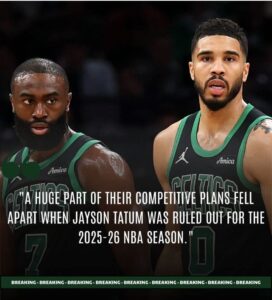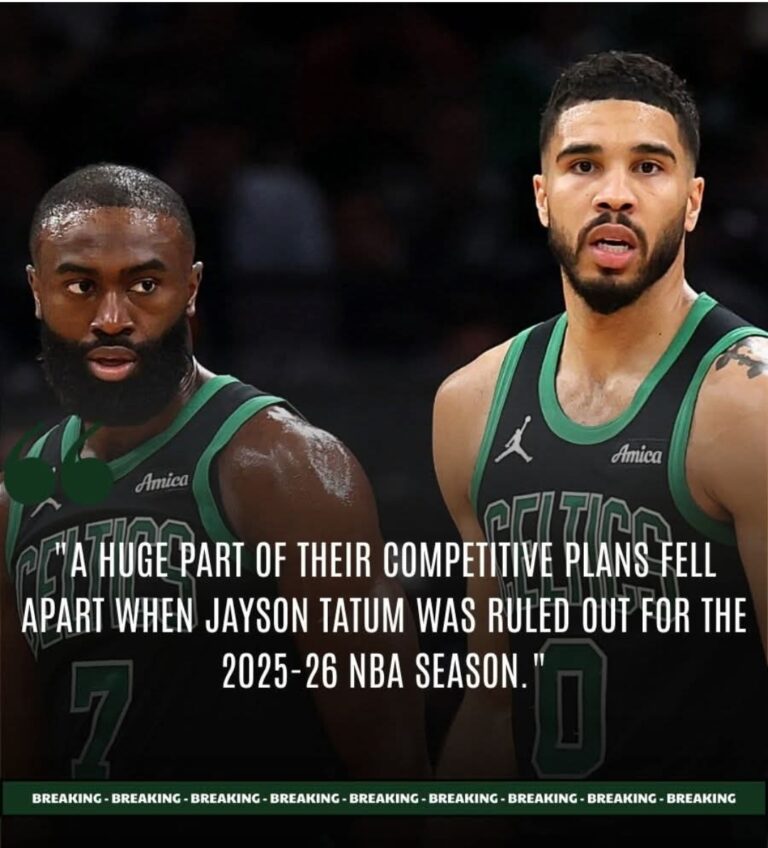As the Boston Celtics gear up for the 2025-26 NBA season, one stark reality looms large: the team is committed to a staggering payroll exceeding $200 million, even as franchise cornerstone Jayson Tatum sits on the sidelines recovering from a season-ending Achilles injury. With Tatum ruled out for the entire campaign, the Celtics are left grappling with a bloated salary sheet that includes massive contracts for Tatum himself and co-star Jaylen Brown, raising questions about the franchise’s short-term competitiveness and long-term financial strategy.
The revelation of Boston’s 2025-26 payroll, detailed in recent league projections, underscores the Celtics’ precarious position. According to NBA salary cap analysts, the team’s active roster commitments total more than $200 million, with Tatum’s supermax extension and Brown’s lucrative deal accounting for over half of that figure alone. Tatum, who signed a historic five-year, $315 million extension last summer—making him the highest-paid player in NBA history at an average of $63 million annually—will collect his full paycheck despite not stepping on the court. Brown, fresh off his own extension, adds another $50 million-plus to the ledger, creating a top-heavy structure that leaves little room for flexibility under the league’s stringent luxury tax aprons.
“It’s a tough pill to swallow,” said Celtics president of basketball operations Brad Stevens in a recent press conference. “We’re paying elite talent, but without Jayson, it’s going to test our depth and resolve. Ownership has been clear: we’re committed to winning, but we have to be smart about it.” The financial strain is exacerbated by the NBA’s repeater tax penalties, which could push Boston’s total bill—including luxury taxes—north of $500 million for the season, the highest in league history. This comes on the heels of offseason moves that saw the Celtics trade away key veterans like Jrue Holiday and Kristaps Porzingis to shed salary and get under the second apron, moves necessitated in part by Tatum’s injury.
Tatum’s heartbreaking injury occurred in May during the Eastern Conference semifinals against the New York Knicks, where a ruptured right Achilles tendon ended Boston’s championship repeat dreams prematurely. The Celtics, who entered the playoffs as overwhelming favorites after a dominant 60-win regular season, were ousted in six games, marking the sixth straight year no NBA champion repeated. Surgery followed shortly after, and while recent updates show positive progress—Tatum was spotted walking without a boot at a New England Patriots training camp in August—team officials have emphasized a cautious approach to his rehab. “We’re not rushing anything,” Stevens noted. “Jayson could be back in limited action by mid-season at the earliest, but the priority is his long-term health.”
The absence of Tatum, a five-time All-Star and the team’s offensive engine, places immense pressure on Jaylen Brown to step up as the primary scoring option. For the first time since his rookie year in 2017, Brown will navigate an extended stretch without his longtime running mate, who has started alongside him in nearly every game over the past eight seasons. Celtics legend Paul Pierce, offering advice in a recent interview, warned Brown against overcompensating. “He can’t have the mindset like, ‘I’ve got to go in and score more points because we’re losing points in Tatum,’” Pierce said. “It’s about what he can do better on the court—pick-and-roll decisions, leadership. The ball was more in Jayson’s hands; now it’s on Jaylen to shoulder that load.”
Analysts project the Celtics as a middling Eastern Conference team without Tatum, potentially facing a “gap year” as they await his return. The trades of Holiday ($32.4 million salary) and Porzingis ($30.7 million) have reshaped the roster, bringing in younger talent and draft compensation but leaving gaps in defense and rim protection. Boston now holds their own first-round pick (28th overall) and could utilize a $5.6 million taxpayer mid-level exception for free agency. If Tatum’s absence is deemed long-term, the team may even apply for a $14.1 million disabled player exception to add salary relief.
Fan sentiment in Boston is mixed, with some calling for a full retool while others remain optimistic about the core’s resilience. “It looks gloomy right now, obviously with JT being out,” Brown acknowledged post-elimination. “But it’s a lot to look forward to.” As training camp approaches, the Celtics’ challenge is clear: justify the massive investment in a star who won’t play, while keeping the franchise’s championship window open. For a team synonymous with success, this season without Tatum could redefine their legacy—or force a painful pivot.
